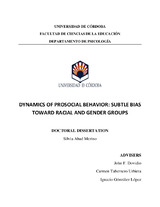Dynamics of prosocial behaviour: subtle bias toward racial and gender groups
Autor
Abad Merino, Silvia
Director/es
Dovidio, John F.Tabernero Urbieta, Carmen
González López, Ignacio
Editor
Universidad de Córdoba, Servicio de PublicacionesFecha
2014Materia
Intergroup relationsDynamics intergroup
Prosocial behaviour
Gender groups
Racial groups
METS:
Mostrar el registro METSPREMIS:
Mostrar el registro PREMISMetadatos
Mostrar el registro completo del ítemResumen
Subtle forms of bias pose significant challenges to achieving equitable intergroup relations
and thus have recently received considerable attention in the field of social psychology.
Although explicit hostility toward minority groups seems to have faded in modern societies,
cross-cultural data show that the status, resources, and the power of women and ethnic/racial
minorities, compared to those of male racial/ethnic majority group members remain unequal. The
present dissertation integrates, both conceptually and empirically, the findings of cross-cultural
research showing the role of paternalistic and legitimizing ideas and behavior for establishing,
maintaining, and reinforcing group hierarchy and the disadvantage of members of traditionally
underrepresented groups. Specifically, research on helping and intergroup relations demonstrates
that intergroup helping relations can be used as a strategic instrument to maintain social
advantage in racial and gender relations. Theoretical insights and empirical evidence provided by
research on the Intergroup Helping as Status Relations Model (Nadler, 2002) reveals that giving
dependency-oriented help to low status groups is a mechanism that allows high status groups to
create and maintain social dominance. The studies presented in this doctoral dissertation are
based on this framework.
The first chapter in this dissertation reviewed the literature on racial-ethnic and gender
disparities in resources internationally and considered the role of subtle bias in perpetuating
inequality. This chapter integrated theory and research on hostile and benevolent sexism,
paternalism, system-justifying ideologies, and helping and status relations. Subtle, as compared
to blatant, forms of bias are more likely to operate to enhance social control over racial/ethnic
minorities and women in a climate in which there is widespread support for egalitarian values...

